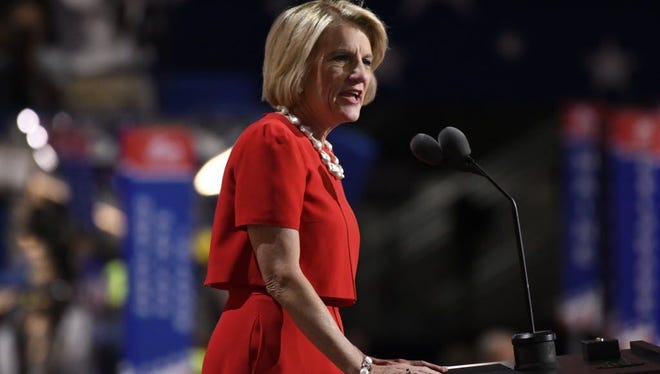The GOP health bill will hurt Americans. Bad backroom deals won't cure that.
A new health care system affecting millions of families is being designed right now in closed-door meetings attended by a small group of Republican senators and their aides. Access to insurance, needed treatments and affordable premiums are being bargained away in exchange for the few votes needed to drag the American Health Care Act over the finish line.

Given the narrowest of margins in the Senate, the fate of the AHCA is likely to be decided by one of several senators you might have never heard of, and by a handful of raw deals that are being dangled in front of them.
All of this should worry you no matter how big your personal stake is in the health care debate.
For all the campaign talk of replacing the 2010 Affordable Care Act with something that increases coverage and reduces premiums, the House bill before the Senate does anything but. With 23 million people losing coverage, premiums jumping 20% and federal protections for those with pre-existing conditions disappearing, it's no wonder that only 8% of Americans want to see it become law.
But only 50 votes are needed to pass the bill, and there are 52 Republicans in the Senate, so Majority Leader Mitch McConnell has decided to go for it. To succeed, he must make deals with a handful of moderates who have serious reservations, but he can’t alter the House bill significantly without losing conservative senators such as Ted Cruz of Texas and Mike Lee of Utah.
After bringing Cruz, Lee and 10 others into a backroom with him to design the Senate bill, McConnell now plans to dispense with the committee process, hearings and input from any dissenting voices. He's aiming for a quick vote within days or even hours after the release this month of an impact study or "score" by the non-partisan Congressional Budget Office.
The strategy makes sense for there to be any hope of success. President Trump in a private session reportedly just confessed the House bill was "mean, mean, mean," and lawmakers who supported it were pilloried for taking away coverage to pay for a massive tax cut for millionaires and corporations. Holding a quick Senate vote before the July 4 recess means angry constituents back home won't tempt Republicans to vote no.
Why should we worry about these backroom deals? It’s not just because the process lacks transparency and consultation with needed experts (yes, health care is complicated). It’s because the private deals proposed to bring senators aboard are likely to be horrible deals for the American public. They offer the appearance of improvements without the substance.
We need patriotism, not severed heads, to make America great again
Robert Mueller should recuse himself from Russia investigation
Let’s look at five backroom deals the GOP hopes will nail down the final votes:
— An “opioid fund” that restores only a small fraction of the massive Medicaid cuts and does not require insurers to cover related physical and mental health services.
— A “delay” of the end date for Medicaid expansion, probably beyond each of the senators’ re-election dates, but which would still end the expansion to people slightly above the poverty line and cause 50 million people to be without insurance by 2026.
— A “facelift” meant to improve the House bill for people with pre-existing conditions, but with loopholes that lead to the same result. For example, insurers couldn’t deny coverage to people with cancer, but they could refuse to cover cancer treatment.
— A small “topping up” of tax credits for older people who will pay much more for care under the House bill, but there will still be an “age tax,” which causes premiums to skyrocket for people in their 50s and 60s.
— “State buyoffs” that give something to one state paid for by all taxpayers.
Senators will claim that these deals have fixed the House bill’s problems. But the truth is that in a bill with more than $1.1 trillion in cuts to care for kids, seniors, small business owners and low-income people, they are essentially meaningless.
POLICING THE USA: A look at race, justice, media
Health care score is Republicans 1, Americans 0: Andy Slavitt
Put yourself in the shoes of one of the principal targets of these deals, Sen. Shelley Moore Capito of West Virginia. She’s hardly a household name. But if the fate of the entire health care debate came down to one person, it could be Capito.
These backroom deals could sound appealing to senators such as Capito but won’t have a meaningful impact. West Virginia has the highest opioid overdose death rate in the country and the highest percentage of adults on Medicaid. The program provides nearly half of opioid treatments in this state, and payments have more than doubled over the last three years.
West Virginia’s uninsured rate would double by 2021 under the GOP plan after being cut by two-thirds under the ACA, and the beleaguered rural hospital system would see tens of millions of dollars in increased bad debt as people without insurance flood emergency rooms. The state would also be one of the five hardest hit in terms of job loss.
Whether Capito exchanges her vote for a deal that hurts her state or decides to stand her ground, she could well end up a household name. And so could the handful of others who are being summoned to backrooms and pushed to accept these fig-leaf deals.
Andy Slavitt, a member of USA TODAY's Board of Contributors, is a former health care industry executive who was acting administrator for the Centers for Medicare and Medicaid Services from 2015 to 2017. Follow him on Twitter: @ASlavitt
You can read diverse opinions from our Board of Contributors and other writers on the Opinion front page, on Twitter @USATOpinion and in our daily Opinion newsletter. To respond to a column, submit a comment to letters@usatoday.com.